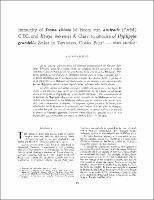Immunity of Toona ciliata M. Roem. var. australis (F.v.M.) C.DC and Khaya invorensis A. Chev. to attacks of Hypsipyla grandella Zeller in Turrialba, Costa Rica
Fecha de publicación
01-01-1970Autor
Grijpma, Pieter
Objetivos de desarrollo sostenible
ODS 3 - Salud y bienestar
Tipo
Artículo
Metadatos
Mostrar el registro completo del ítemResumen
In experimental plots at the Inter-American Institute of Agricultural Sciences, Turrialba, Costa Rica, Toona ciliata var australis (Australian Cedar) and Khaya ivorensis (Nigerian Mahogany) are not attacked by the Meliaceae borer (Hypsipyla grandella), whereas native Meliaceae such as Cedar (Cedrela spp.) and Mahogany (Swietenia spp.) are heavily attacked. In many tropical countries on other continents, these Latin American Meliaceae are not attacked or are less attacked by native Hypsipylas, although some countries report serious attacks.
The author assumes that volatile essential oils in the shoots and leaves, which would be different for various but probably not all Meliaceae, attract the Hypsipyla spp. butterfly to the host trees. A specialization of the Hypsipyla butterfly on certain essential oils of the native Meliaceae led to the immunity of exotic Meliaceae that did not have these essential oils as main components. Some research projects related to the hypothesis of olfactory orientation of the Hypsipyla butterfly to its host tree are proposed. In view of its rapid growth, its valuable wood, and the absence of attacks by Hypsipyla grandella, the species Toona ciliata var. australis appears to be very promising for forest plantations in Latin America.
Palabras clave
Representación
Sede Central
Editor
Instituto Interamericano de Ciencias Agrícolas (IICA)
Es parte de
Turrialba Vol. 20, no. 1
Status
openAccess
URI (Enlace permanente para citar o compartir este ítem)
https://repositorio.catie.ac.cr/handle/11554/13240Colecciones
- Turrialba [358]


